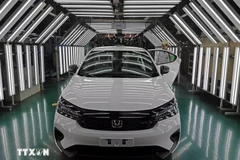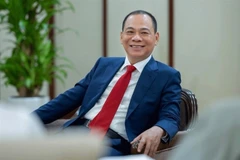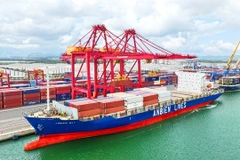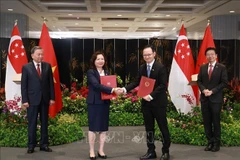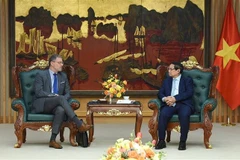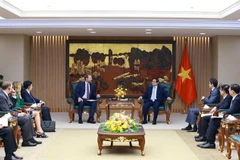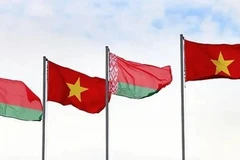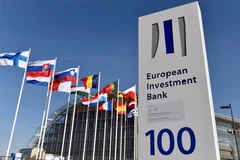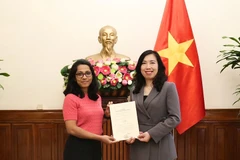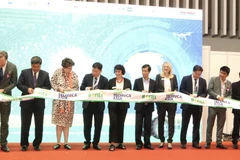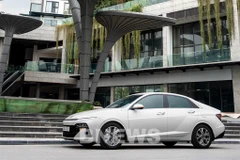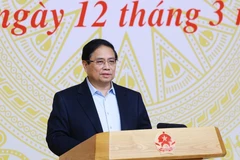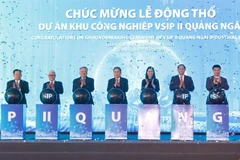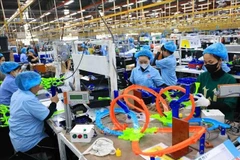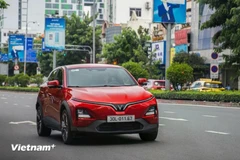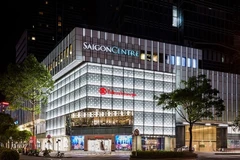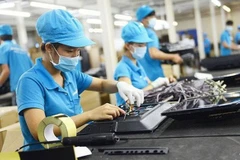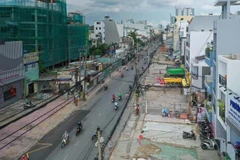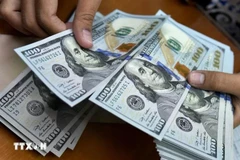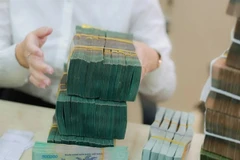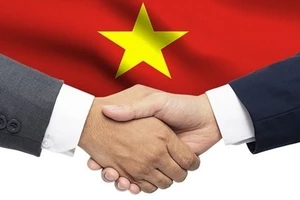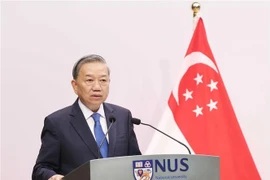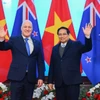Vice Chairman ofthe Provincial People's Committee Ho Van Nien said current successes arethe very motivations for Ba Ria - Vung Tau to keep moving on the roadahead towards the target of building and developing Ba Ria - Vung Tauinto a modern industrial port province by 2015.
The Vice chairman Nien had a talk with Vietnam Business Forum as following:
*What are the potentials and advantages of the province in promoting the development of key economic sectors?
BaRia - Vung Tau possesses diverse potential advantages - an importantprerequisite for attracting investment, developing the economy,realising the objective of building Ba Ria - Vung Tau into a modernindustrialised province with a strong sea-based economy. The province isalso powered by national and international commercial port system and aregional and national centre of industry, services, tourism andfisheries.
Specifically, the province’s deepwater seaport systemwith a designed capacity of 250 million tonnes a year is the nationalgeneral port and an international gateway port capable of receivingvessels of 160,000 DWT. Goods exported from Thi Vai - Cai Mep Port areshipped directly to the United States, and other countries andterritories around the world without via transit ports. The deepwaterseaport system creates advantages for Ba Ria - Vung Tau to developcommercial services, industry and import and export activities.
Theprovince has 14 industrial zones with a total area of about 8,400 ha,close to the Thi Vai - Cai Mep port system and thus has favourableconditions for international trade development. Their infrastructure isbeing completed and ready to welcome investors.
On the oil andgas industry, the continental shelf of Ba Ria - Vung Tau waters isestimated to contain 1.5 billion tonnes of oil and 1,000 billion cubicmetres of gas; thus the province has become the oil and gas centre ofVietnam and is home to gas-fuelled industries like electricity,liquefied petroleum gas, fertiliser, steel and construction materials.
Atpresent, Ba Ria - Vung Tau province has eight power plants with acombined capacity 4,224 MW and accounts for nearly 40 percent of thecountry’s electricity production.
On transport infrastructureconnectivity, Ba Ria - Vung Tau has favourable traffic systems forinternational trade, it enjoys national highways linking to industrialzones, ports and tourism sites in the province. Apart from Ho Chi MinhCity-based Tan Son Nhat International Airport in operation, the LongThanh International Airport in Dong Nai province, expected to go intooperation in 2020, is only 30 km away from Cai Mep - Thi Vai portcomplex. Currently, according to the plan, key national transportprojects will be invested and put into operation before 2020, includingexpressways and Bien Hoa - Vung Tau railway.
On tourismdevelopment, the province’s tourism infrastructure system is invested.Many new accommodation establishments have been put into service,including 5-star Imperial Hotel, Vung Tau Car Cable Resort, SixsencesCon Dao Resort and Ho Tram Asean Coast Resort. Up to now, the provincehas 195 operational hotels and resorts with more than 8,300 rooms, with114 hotels ranked from one to five stars.
*Currently, most oiland gas reserves of Vietnam are off the coast of Vung Tau. Therefore, ina recent interview given to the press, Professor Nguyen Mai, a seniorexpert in foreign direct investment (FDI) and former Deputy Minister ofPlanning and Investment, proposed locating all oil refineries in Ba Ria -Vung Tau rather than scattered in other localities. What do you thinkabout this?
Oil and gas production has significantly contributedto the country's economy. Oil and gas exploration and exploitation hasspurred the development of many other economic sectors such aselectricity, nitrogenous fertiliser, liquefied petroleum gas, mechanicalengineering, ship building and repairing, oil-rig fabrication,shipping, and logistics. Oil and gas industry in general andpetrochemical industry in particular have many national key projects.Hence, investment must follow approved plans of the Government andinvestment locations are decided by central authorities.
Ba Ria -Vung Tau established Long Son Oil and Gas Industrial Zone to developthe petrochemical industry. And, the province is calling investmentcapital for oil refinery projects. Currently, a 3.77 billion USDpetrochemical project is clearing the 461-ha site for buildingproduction facilities, with the first phase expected to come intooperation by 2017. We hope the oil refinery project to be carried out asschedule to foster socioeconomic development.
*Seaports andlogistics services are interconnected. Seaports must be supported bylogistics services, and vice versa. Are logistics services in theprovince fit and capable to support seaport operations? To turn Ba Ria -Vung Tau into a world-class logistics services centre, what logisticsindustry development strategy has the province taken?
Logisticsindustry now holds an increasingly important position in moderneconomies and has a great influence on economic development of allnations on the globe. In the context that Vietnam is integrating moredeeply into the world economy, investment and trading activities are onthe rise, production develops and the demand for cargo transportationand production support services grows up, the development of logisticsservice system is thus necessary. However, in recent years, thedevelopment of local logistics services has failed to meet demand.
Takingits advantages of geographical location, natural conditions andeconomic potential, Ba Ria - Vung Tau province set the target ofbecoming a modern industrial and port province which will embraceworld-class logistics services centres. To achieve this goal, in thecoming time, Ba Ria - Vung Tau plans to carry out some key tasks asfollowing:
First, carrying out economic restructuring programme;improving economic growth quality, efficiency and competitiveness; usingport development as the leverage for the development of port, shippingand post-port services.
Second, selectively attracting investmentprojects into existing industrial zones and setting up new industrialzones to meet development needs; developing oil refining industry andpetrochemical product processing and port-supporting industries.
Third,building and developing Ba Ria - Vung Tau into a regional logisticsservices centre; developing port logistics services in Cai Mep - ThiVai, Vung Tau and Con Dao areas, forming goods distribution centresassociated with ports; perfecting deepwater port system; traininglogistics human resources, etc.
Fourth, raising capital forinfrastructure development; upgrading and improving trafficinfrastructure system that links deepwater ports, roads and sea routes,connects Ba Ria - Vung Tau with other provinces in the southern keyeconomic zone and the region to serve freight flows in Cai Mep - Thi Vaiports, expressways, Ho Chi Minh City - Bien Hoa - Vung Tau Railway, andcrossroads that link Highway 51 to Cai Mep ports.
In addition,the Provincial People's Committee proposed the Ministry of Transport towork with the Ministry of Transport to reduce pilotage fees, tonnagedues and maritime insurances for ships of over 50,000 DWT and applyCircular 41/2012/TT-BTC to all vessels (including vessels of under50,000 DWT) in Cai Mep - Thi Vai ports to attract feeder vessels.
*Publicadministration reform is defined by provincial authorities as the keyelement for sustainable and effective economic development. So, what hasthe province done to bring administrative reform to life and make BaRia - Vung Tau different from others?
Public administrationreform is one of the key tasks directed by the Provincial People'sCommittee and seriously performed by governments at all levels. Theprovince has implemented many measures to create favourable investment,production and business environment like building infrastructure,training human resources, stepping up administrative procedure reform,helping investors to deal with difficulties in their investmentactivities, etc.
To bring administrative reform to life toimprove the investment environment, reduce troubles and facilitatebusinesses and citizens, the province has reviewed current regulationsto cut red tape, intensified inspection and streamlined administrativeprocedures for businesses and citizens.
Besides, the province hasapplied information technology to administrative procedures to buildone-stop-shop mechanism. It will focus on strengthening e-officeapplication and applying ISO 9001:2008 quality management system todepartments and localities. At the same time, the province will speed upmeasures to raise provincial competitiveness index (PCI) and theprovincial economy integration index (PEII).-VNA
